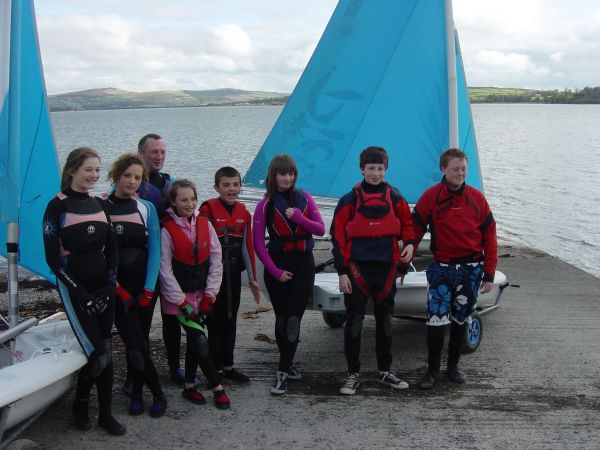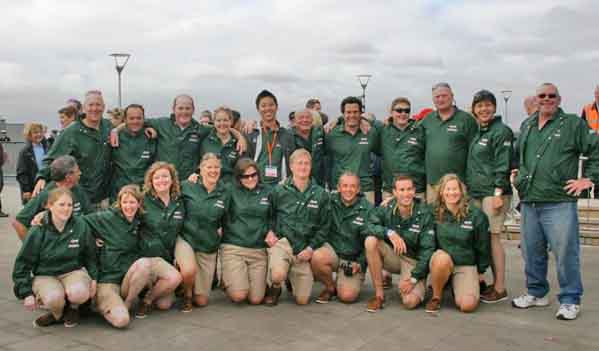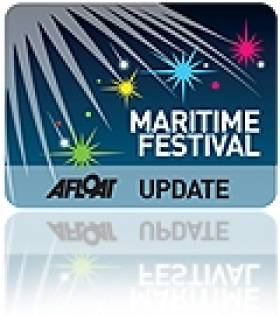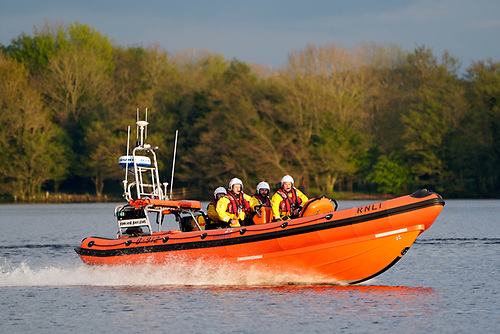Displaying items by tag: Lough Swilly Yacht Club
Boats Head for 'Foyle Days' 2011
Over the years she has changed hands between Dutch and UK interests for recreational use. Several years ago she starred in the RTE TV reality show 'Cabin Fever' where she replaced the show's first ship Camaret of Cornwall (branded as 'Cabin Fever') after it ran aground off Tory Island.
During the two-day festival (11am-5pm) the boating community at the event will include the Coleraine Yacht Club, Foyle Paddlers, Foyle Punts, Lough Foyle Yacht Club, Lough Swilly Yacht Club, Moville Boat Club, RNLI and the Foyle (SAR) Search and Rescue.
Visitors to Foyle Days can call to the Clipper stand and learn more about the city's entry of the Derry~Londonderry boat in the 2011-2012 Clipper Round the World Race. Learn more about the countries the crew will visit and also how to get involved in the event. For more information about the race, at 40,000 miles is the world's longest race go to www.clipperroundtheworld.com/
Running alongside the festival a continental market with 40 stalls will be open to all at the recently revamped Guildhall Square. For further details about Foyle Days click here.
- Clipper Race
- Maritime Festival
- RNLI
- Lough Foyle Yacht Club
- Lough Swilly Yacht Club
- Moville Boat Club
- Derry
- Londonderry
- Tory Island
- JOHANNA LUCRETIA
- Foyle Days
- RTE TV
- Cabin Fever
- Camaret of Cornwall
- Grounding
- Reality TV show
- Clipper Around the World Race
- Guildhall Square
- Continental Market
- Coleraine Yacht Club
- Foyle Search and Rescue
- Foyle Paddlers
- Foyle Punts
- Offshore Sailing
- Clipper Round The World Race
- JOHANNA LUCRETIA
Lough Swilly Yacht Club Launch 2010 Season
‘Lough Swilly Yacht Club successfully launched the 2010 boating season on Sunday. Commodore Paul McSorley welcomed members attending The Opening Day Lunch at the LSYC Clubhouse in Fahan, Co Donegal. New members along with long standing members enjoyed a splendid lunch with entertainment provided by local traditional musicians. Many of the young members were able to take the opportunity to launch the Club’s recently purchased Pico’s, which will be used for the Learn To Sail Courses to be run later in the summer.
In his welcome address, Paul McSorley, said, ‘We are delighted at the turn out today and welcome all, in particular our guests; Malcolm Houston, RNLI, Rosin McAnallen, Ocean Youth Trust and Karena Hanley, Rathmullan Sail Club. We look forward to a busy sailing season with our series of races, as well as many open events including, Tory Island, Foyle Days, and Swilly Worlds Regatta. New this season will be our WOW - ‘Women on Water’ Day, which is an initiative started by Irish Sailing Association to encourage more female participation in this sport.’
Come and Try It
Paul added,’The Club is hosting an Open Evening on Thursday, May 13, when the facilities will be available for those interested to try it for themselves. So bring friends, colleagues and give them a chance to enjoy the thrills of sailing on this spectacular lough’.
Key Events
Tory Island Race June 5
Foyle Days June 12/13
WoW Day June 20
Melmore July 10
Swilly World Regatta July 31 – August 2

Commodore of Lough Swilly Yacht Club ( ) launching the Club’s new Pico Dinghies along with some of the young members at the Open Day held in Fahan, Co Donegal
For further information, check www.loughswillyyc.com or e-mail [email protected].
Lough Swilly Yacht Club

Above: the crew of Cork at the beginning of the Clipper Race 2009
Lough Swilly Yacht Club
Lough Swilly Yacht Club is based in Fahan Creek on the shores of Lough Swilly, Co Donegal, three miles from Buncrana and ten miles from Derry.
Our membership consists of IRC-racing and cruising sailors as well as powerboat enthusiasts and some keen dinghy sailors. All club members enjoy spending time pottering about on the lough and many like to venture further afield; either to cruise or to represent the club in competition (see the Ships' Blog section for more).
Club History
The Lough Swilly Yacht Club was founded in February, 1955, when a meeting took place in the old City Hotel, with a view to forming a 'club' to encourage sailing and power boating in Lough Swilly by every possible means.
The first Officers of the club were: Commodore Dr. T.E. Hastings. Vice Commodore James McColgan. Rear Commodore Stephen Faller. Secretary Mayne Elliot and Treasurer Norvall Watt. A Committee was set up of men who between them had a wealth of sailing experience and whose enthusiasm and sheer hard work laid the firm foundation of today's thriving club.
The club was fortunate to have as a founder member Mr. James Whyte, Manager of the Lough Swilly Railway Co. and when the railway line from Derry to Buncrana closed in 1953 the club was able to purchase for a very nominal sum the old station waiting room and ticket office, as well as a considerable amount of ground where the old railway line ran beside the water's edge. This formed the nucleus of the present club and in subsequent years the slipway was built and extended, the caravan site erected and the clubhouse itself took in the old station house.
The first racing took place at 3.30pm (Swilly time) on Opening Day, Saturday 2nd July 1955, and there was a fine turnout of miscellaneous craft. After the day's racing all members and friends were invited to afternoon tea at the temporary club premises on the Railway Station Platform in Fanad, durning which prizes were awarded.
(The above information and image courtesy of Lough Swilly Yacht Club.
Lough Swilly Yacht Club, c/o Karen Sleat, Fahan, Lifford, Co Donegal. Email: [email protected]






























































